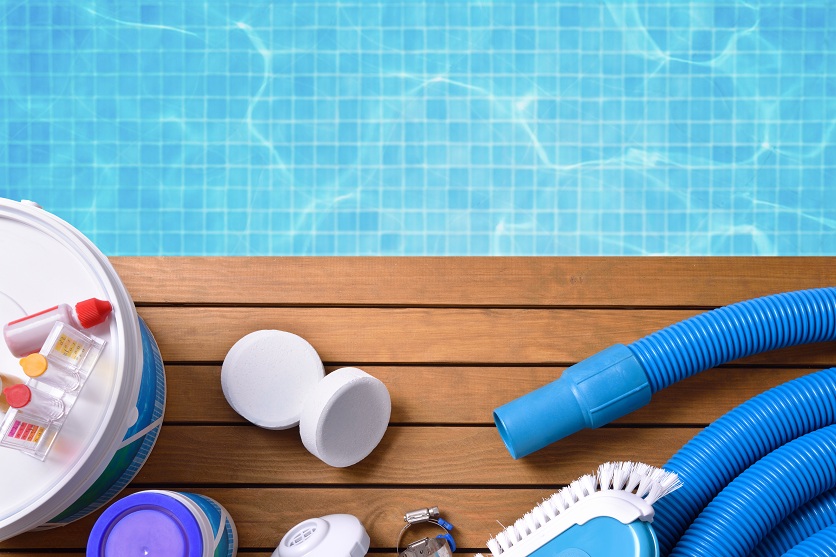A swimming pool requires regular cleaning to ensure safety and hygiene. Several household items can be used to clean a pool. Here are some of the most common ones.
1. Baking Soda
Baking soda is an excellent chemical for use in cleaning pools. It has many uses, including as a deodorizer and an abrasive cleaner.
The best way to use baking soda is to dissolve it in water before pouring it into your pool. You may also want to add a few drops of liquid dish soap or baby shampoo to help make the solution more effective.
Once you have added the baking soda to the water, stir well so that all of the baking soda dissolves. Then pour this mixture into your pool.
As the baking soda works its magic on the dirt and grime, it leaves a fine powder behind. This powder helps keep algae from growing in your pool.
2. Salt
You should never use table salt when cleaning your pool because it contains chemicals that could harm fish. If you decide to use table salt, dilute it first by mixing one salt with four parts water.
After mixing, pour the diluted salt directly into your pool. Be sure not to get any of the salt on plants or other areas where it could damage them.
3. Chlorine Bleach
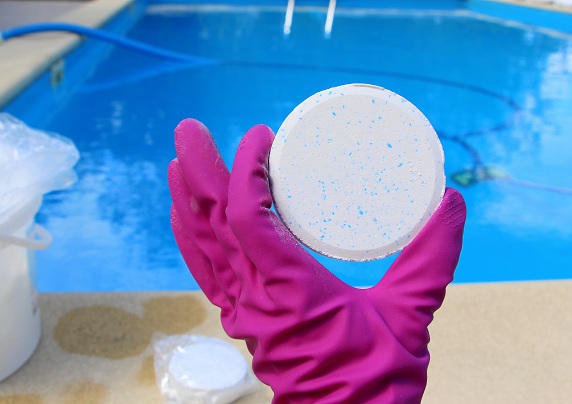
Chlorine bleach is another popular choice among pool owners. Like baking soda, chlorine bleach can kill bacteria and germs in your pool. To use chlorine bleach, follow the instructions that came with the product.
Make sure you test the concentration level using a sample of your pool water. Only then should you fill your entire pool with chlorine bleach.
4. Boric Acid
Boric acid is an excellent alternative to chlorine bleach. Boric acid kills bacteria without harming animals or plants. It’s also inexpensive, which makes it a good option for those who don’t like spending money on pool chemicals.
Boric acid is safe to use around children and pets, but only during regular hours since it can cause skin irritation if exposed to sunlight.
5. Vinegar
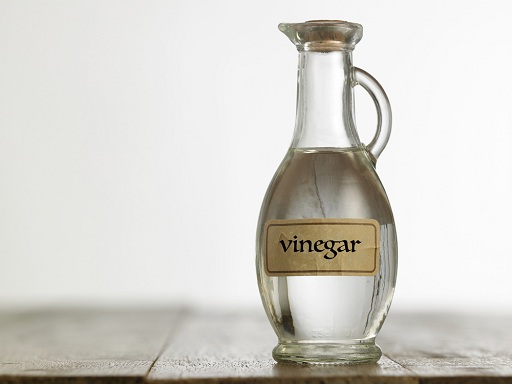
Vinegar is an affordable and natural disinfectant for your pool. Since vinegar is acidic, it eats away the minerals algae need to grow.
So, when cleaning your pool, remember to neutralize the pH level by adding alkaline material such as baking soda to your pool water.
6. Borax
Like boric acid, borax is a natural disinfectant that kills germs while leaving no harmful residue. Borax is available at your local home improvement store, usually next to the laundry detergent.
Borax powder is much stronger than boric acid, so add half the amount called for in the recipe before testing the water.
7. Lemon Juice
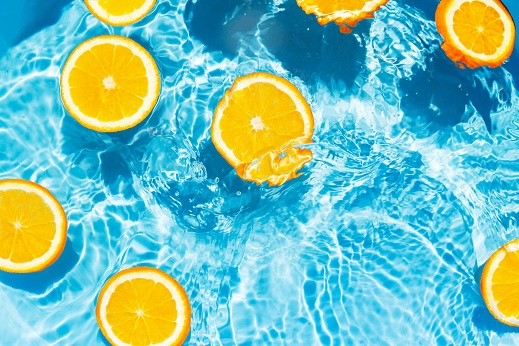
Lemon juice is yet another natural remedy that can be used to fight off algae growth. All you need to do is mix equal amounts of lemon juice and hydrogen peroxide and let sit overnight.
In the morning, strain the mixture through a cheesecloth and discard the solids. Use this mixture to rinse your pool after each use thoroughly.
8. Algae Away
Algaecide is a type of medication that prevents algae from forming in the first place. Several algaecides are available, and they work differently depending on what kind of algae is causing the problem.
For example, copper sulfate is often effective against blue-green algae but ineffective against red algae. Follow the directions provided by your manufacturer to ensure that you’re getting the suitable algae treatment.
9. Olive Oil

Olive oil has been proven to help prevent algae from growing, especially if there is already algae present. Add two tablespoons of olive oil to your swimming pool every week.
The oil will naturally break down over time, so you’ll have to replace it about once a year.
10. Vitamin C Tablets
If you want to get creative, vitamin C tablets are a great way to keep your pool looking fresh all summer long. Dissolve one tablet into eight ounces of water and stir well.
Let the solution stand overnight, drain the tablet, and wash it down. Repeat this process daily until the vitamin C tablets have dissolved completely.
How to Clean Your Swimming Pool
1. Remove Any Dirt
Before starting any cleaning project, ensure you’ve removed any dirt or debris from the pool’s surface. This step is essential because you don’t want to damage the finish with abrasives accidentally. If necessary, use a vacuum to remove the dust and debris.
2. Test the Water
After removing any dirt or debris, test the water for safety using a meter. You should always check your pool water’s PH balance (pH). Ideally, the pH should be between 7.2 and 8.0. If the pH is too high, you may notice a greenish tint to the water.
If the pH is low, the water could potentially cause health problems for swimmers. Remember to adjust the pH back up to its ideal range if necessary.
3. Scrub Down Surfaces
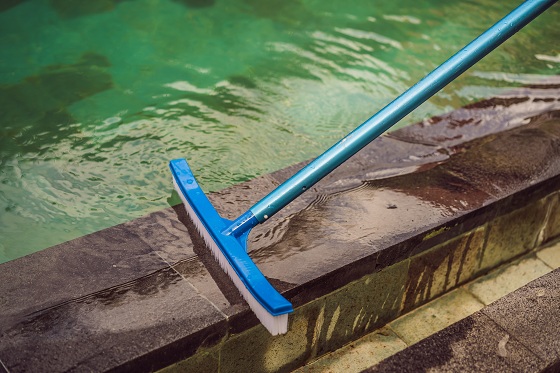
Once you know that the water is safe to swim in, it’s time to scrub down the surfaces of your pool. Start by rinsing the walls with warm water and applying a small amount of liquid dish soap.
Work your way around the entire perimeter of the pool, making sure to scrub along the bottom as well. Next, apply some pressure to the wall with a sponge or brush to loosen the gunk. Finally, use a hose to spray the area thoroughly.
4. Wash Floors and Walls
Once you’ve cleaned the sides of the pool, move onto the floor and walls. First, fill a bucket with warm water and a few drops of bleach. Dip a sponge or rag into the solution and gently rub it along the floor.
Continue working across the room, washing away any stubborn stains left behind. Afterward, rinse the floor with clear water and let dry.
5. Spray Down Equipment
Finally, it’s time to take care of your equipment. First, turn off the power supply at each piece of equipment before beginning the cleaning process. Then, pour a cupful of vinegar into the filter basket of each piece of equipment.
Make sure to cover the intake vents on the equipment as well. Allow the vinegar to sit for 30 minutes, then rinse the filter baskets with clear water. Finally, wipe down the equipment with a soft cloth and let the air dry.
6. Maintain Proper Filters
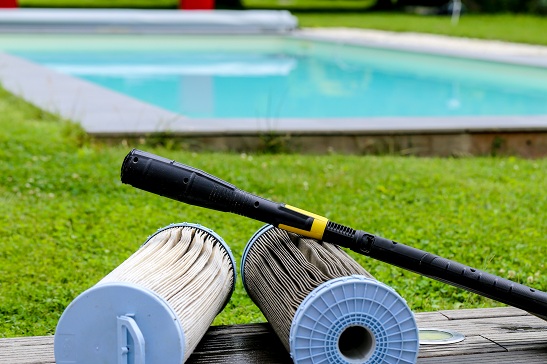
Finally, it’s time to maintain proper filtration in your pool. To do this, change the filters when they reach their recommended lifespan. Most pools require changing them every three months, but you can also go longer than this, depending on how often you’re swimming in the pool.
Also, remember to replace the chemicals that come with the filters when they expire. Doing so will ensure that your pool stays healthy throughout the year.
Benefits of a Clean Swimming Pool
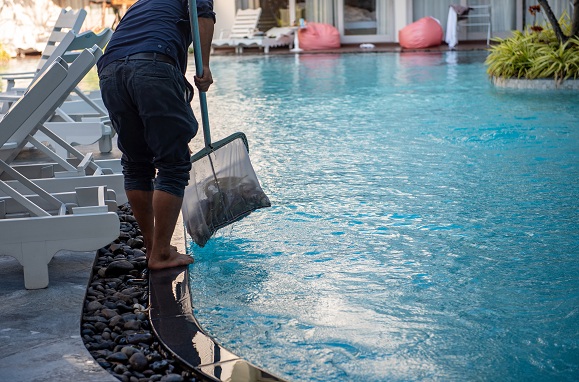
Swimming pools are great places to relax after a long day. However, they can quickly become dirty and unsanitary if not adequately maintained.
Fortunately, there are many ways to keep your pool clean without spending hours doing it yourself. Here are just a few benefits of maintaining a clean pool:
1. It Makes Your Family Healthier
A clean pool makes your family healthier. The chlorine helps kill bacteria and keeps harmful germs like E. coli and giardia away. Additionally, the UV rays from the sun helps prevent skin cancer and other diseases.
2. It Keeps Pets Safe
A clean pool means fewer chances of dangerous accidents happening. For example, a dog who accidentally falls into the pool might drown because he doesn’t have enough oxygen in his lungs. Similarly, a cat could get stuck inside the pool and suffocate.
3. It Helps You Save Money
Keeping your pool clean saves money. Not only does it eliminate the need to buy new supplies, but it also prevents expensive repairs caused by dirt and debris.
4. It Improves Home Value
Keeping your pool clean increases its value. This is especially true if you live in an area where homes with pools tend to sell faster. If you want to increase the value of your home, consider adding a spa or installing a waterfall feature.
5. It Increases Safety
A clean pool reduces the risk of drowning. Children are more likely to drown if they play near the edge of the pool or fall into the deep end. Likewise, adults are less likely to be injured diving into a pool if it has been thoroughly cleaned.

